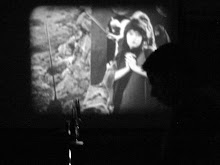David Mitchell, at just forty-one years of age, I understand is an accomplished novelist. His earlier works have been very well received; shortlisted and longlisted, twice each for the Booker Prize. In 2003 he was one of Granta's Best Young British novelists under-35 years of age. His earlier works are supposedly very complicated in structure while here he has a conventional simpler chronological structure. "Thousand Autumns..." was on the longlist for the Man Booker Prize 2010. It didn't proceed to the shortlist.
So much for author profiling let me get to the novel. It is written in five parts, in present tense. Large consensus has been that the first part is hard to get through but the rest of the book is fast paced. I mostly agree though I didn't find the first part entirely boring. Sure nothing much happens in the progression of the plot but it does provide a perspective of life in Dejima. Usually I associate white men in the east with being in the driver's seat but now forgot it wasn't so in Japan. The first part tells us how devoid of power the chief of Dejima is, familiarizes us with nearly every white man on the artifical island and makes us realize Jacob de Zoet's integrity is his only weapon. The second part shifts from Dejima to Japan. The novel now moves into territory I am very familiar with, it's written like a thriller. There is an superb chapter with a conference on medicinal advancements in the west and how Japan needs to progress by sending Japanese to other lands, improving military, etc. I enjoyed the second part very much, so much so that my mind starting scheming the rest of the book as Jacob leading Orito's rescue very very actively. I started visualizing Jacob stealing himself out of Dejima, in disguise, incognito, hiring more Japanese Ninja or Samurai and blasting his way through Mount Shiranui to reach the Shrine on top and save Orito. All this, of course, happening in a Tarantino-isque way . This is where Mitchell took me by surprise. In the fourth part we are introduced to a new character, Captain Penhaligon of a British ship, Phoebus. The name of the ship, its link to the story in the novel, the actual story that takes place a decade later, the story of Captain Penhaligon's struggle with gout, his memories of his wife, his son and his own career make him my favorite character in this novel. David Mitchell uses the protection of Dejima from a British ship as a mask to solve Aibagawa's problem, take care of Enomoto and the magistracy. That the main obstacle is solved in the backdrop of swashbuckling action, diplomacy and a match of Go was so so so new to me.
I also like the various distractions Mitchell sets up right through the novel. It's a technique I am inspired to use, if I ever write in future, because it breaks the standard sequence of set-up followed by process-of-rescue used in most movies and books. David Mitchell introduces redundant characters right through with their own stories which are interesting in their own way. I believe he does this to open, in the readers' minds, a multitude of possibilities the novel can take. Every character with his or her history need not play any role in the progression of the story. There is a chapter in first person by a slave, there is the monkey named William Pitt, lots of other animals floating around, there are backgrounds for every white man in Dejima, there's a six-hundred year old wizard or some such etc. many of which are eventually unused or used in unconventional ways. However, while reading about them I was continuously constructing the narrative trajectory in my head, but Mitchell doesn't take the conventional route which I just love.
The writing style is new to me. It is written in present tense. The dialgoue is often interrupted, several times on many occassions, to set the ambience of the location through visual and sound. I had to read some passages of dialogue twice to build the complete mental picture, being the jobless person I am it was perfectly fine.
The very little historical fiction that I have read I have enjoyed very much and this book is no exception. I'd have liked to see this proceed to the shortlist.

No comments:
Post a Comment